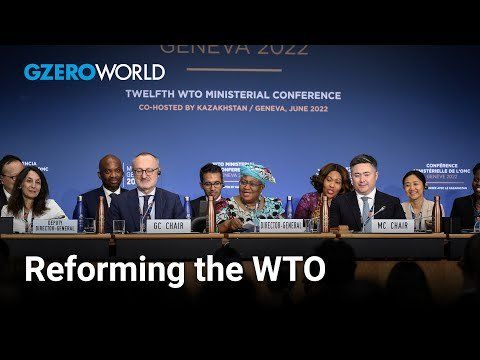October 06, 2023
The appeals body of the World Trade Organization (WTO) is like the Supreme Court for global trade. But it’s fundamentally broken: it hasn’t been able to hear any cases or issue decisions since 2019.
The US has blocked new appointments of WTO appeals judges under the Obama, Trump and Biden administrations, complaining that the organization’s rules have hurt US jobs and industry while it lets China protect its massive domestic market from foreign competition. Until WTO reform happens, the US says, it will block any new judges from sitting on the appeals bench.
Without a minimum of three appeals judges, the WTO can’t resolve disputes. And that’s a major problem for the world’s only international organization dealing with the rules of trade between nations. But there may be hope in sight.
On GZERO World with Ian Bremmer, WTO Director-General Ngozi Okonjo-Iweala said she is hopeful the dispute settlement impasse will be resolved by the WTO's 13th Ministerial Conference (MC13) in February 2024.
“[The United States] are not the only ones who have problems with the system. Developing countries also find it difficult to access,” Okonjo-Iweala says, “So let’s take all these complaints, reform system, and make it useful for everyone.”
Watch the full interview: World trade at risk without globalization, warns WTO chief Ngozi Okonjo-Iweala
Catch GZERO World with Ian Bremmer every week at gzeromedia.com/gzeroworld or on US public television. Check local listings.
More For You
As expected, the Supreme Court struck down the bulk of Donald Trump's sweeping “Liberation Day” tariffs as illegal … and almost nothing changed.
Most Popular
What's Good Wednesdays
What’s Good Wednesdays™, February 25, 2026
Sponsored posts
Small businesses at a crossroads
Chris, an Army veteran, started his Walmart journey over 25 years ago as an hourly associate. Today, he manages a Distribution Center and serves as a mentor, helping others navigate their own paths to success. At Walmart, associates have the opportunity to take advantage of the pathways, perks, and pay that come with the job — with or without a college degree. In fact, more than 75% of Walmart management started as hourly associates. Learn more about how over 130,000 associates were promoted into roles of greater responsibility and higher pay in FY25.
Ukraine's President Volodymyr Zelenskiy, Finland's President Alexander Stubb, Estonia’s Prime Minister, President of the European Commission Ursula von der Leyen and other European leaders visit memorial to fallen Ukrainian defenders at the Independent Square on the fourth anniversary of Russia's full-scale invasion, in Kyiv, Ukraine February 24, 2026.
Ukrainian Presidential Press Service/Handout via REUTERS
Somewhere in the Donbas region, Ukrainian soldier Artem Bondarenko says he hasn’t slept through the night in months as he defends Eastern Ukraine.
- YouTube
In the latest episode of Vladimir Putin and Xi Jinping's hit wellness podcast This Authoritarian Life, we learn how positive communication patterns can break negative cycles in our relationships -- especially our relationships with Iran, Syria, Venezuela, and Cuba. #PUPPETREGIME
© 2025 GZERO Media. All Rights Reserved | A Eurasia Group media company.
